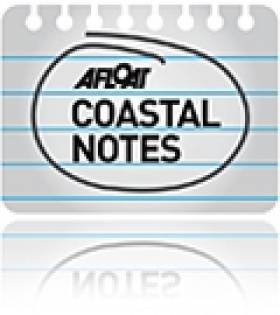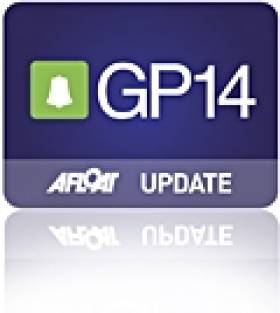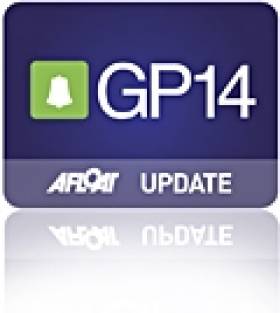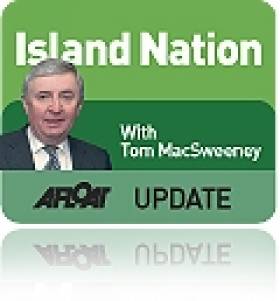Displaying items by tag: youghal
Narrow Margin Between Life And Death At Sea
Listening to a seafarer describe how colleagues from his native town left port on a night of very bad weather, when their Skipper was advised not to go by other Skippers, I thought of how there can be a very narrow margin between life and death.
Those men and their vessel never made it from the British coastline to Youghal in East Cork, which was once the biggest and busiest seaport in the Republic.
Youghal is a seaside town which has suffered heavily in recent years from recessionary impact and decline of industry in the area. Hundreds of jobs have been lost. It is a seaside town which, before the advent of cheap air travel to foreign locations, was a dominant holiday resort. It is where the famous ‘Moby Dick’ film was shot, chosen because of its maritime appearance. It is a town which is legendary for its schooners and schoonermen, trading from Ireland across the Irish Sea to the UK.
It is also where I present THIS ISLAND NATION radio programme on the town’s community radio station, CRY104FM, every Monday night ad from where it is also transmitted to other stations in Dublin, Dundalk, Athlone, Galway, Clare and Cork and here to the Afloat website. It is introduced with the theme music which caught the attention of listeners during my 20 years presenting SEASCAPES on RTE Radio, ‘Sailing By.’ This is the version of that tune played by another sailor, Ronnie Aldrich from the Isle of Man and his orchestra on his LP, ‘Sea Dreams.’ RTE dropped it as the programme’s theme tune after I left, but it is indelibly associated with the maritime sector, another version being used by BBC Radio for its late night sea area weather forecast, played by Ronald Binge and the BBC Light Orchestra. So I resurrected it for my new programme and it has again attracted considerable attention around the nation and abroad, where the programme is also transmitted through Mixcloud and Tune In Radio.
Listening to the interview of Pa Ahern, then an Able Seaman on another legendary Youghal vessel, the Kathleen and May, as we transmitted it, I heard him tell his story of sailing on that ship and how, when he went on board for the first time, he knelt down and kissed the wood of the ship: “I don’t know why I did it, I had it done before I knew it,” he told the interviewer, Noel Cronin, in a recording from the station’s archives. Pa is deceased but, through my headphones, his voice brought alive the scene he described on a night of very bad weather, when another Youghal schooner, the Nellie Fleming, sailed that fateful night and the five men crewing her, all from Youghal, died. Pa described how the Skipper of the Kathleen and May which he was aboard, also decided to sail, but the weather was so bad that a crewman told him he would kill them all and the Skipper turned the ship around and they headed back into port, which was a “tough struggle against the conditions”. Pa been put to watching for navigation lights and described how he saw a ship in the distance in high seas driven by gale force winds, with lashing rain. “It had lost a mast, but I am sure it was the Nellie Fleming…” It was the last sight anyone saw of that vessel, which is the subject of a new book by Youghal historian and author, Mike Hackett, called ‘Lost Without Trace”. The old sailing ships were tough, demanding vessels and could be dangerous in difficult weather. There were some which did not survive. One was the Nellie Fleming, lost coincidentally in the same month of February 1936 when another major maritime event occurred on the East Cork coastline, not far from Youghal.
This was the rescue of the Daunt Rock Lightvesel crew after it broke from its moorings at the entrance to Cork Harbour. This week is the anniversary of that rescue, still regarded as the most famous in Irish lifeboat history. It was carried out by the Ballycotton Life crew under legendary Coxswain Patsy Sliney and they were all awarded medals for their courage. Unusually, so was their boat - the Mary Stanford - now ashore on permanent display in the East Cork coastal village and worth a visit if you are ever in that area.
Mike Hackett’s book tells that the Fleming family which owned the ill-fated Nellie Fleming had lost their original ‘Nellie Fleming’ vessel when it went aground at Ardmore in 1913. All the crew were saved from that shipwreck. Then, in 1916, Fleming’s purchased a vessel named ‘Emily’. It had been built at Carrickfergus in 1884. The name was changed to ‘Nellie Fleming’ and she was registered at Cork.
The Kathleen and May is the last remaining British-built wooden hull three-masted topsail schooner. Registered in Bideford, North Devon, there have been several attempts to restore and preserve her. Last heard of she was based in Liverpool and listed as part of the UK National Historic Fleet.
How did the Kathleen and May get back into port safely that bad February night? Pat Ahern said it had an engine: “Without it we would never have got back.”
These stories underline for me how narrow is the margin between life-and-death.
• Listen above to the programme on the Afloat website
Talk of Youghal Marina is 'Premature' – Pressure Group
'Talk of a Marina in Youghal is just talk', says Martin Finn of Youghal Maritime Development Group. Currently, there are no visitor moorings, no landing jetties, no berths and only one of the five slipways is still usable. Here, the pressure group spokesman responds to Afloat's report of much needed pontoons for the south coast harbour and gives an update on marine leisure facilties in the County Cork town.
Youghal is one of the oldest ports in the country, with a history dating over 1,000 years. Still today Youghal is working port, immediately adjacent to the sea and offering all tide access to smaller shipping. Youghal is also a fishing port of repute, and combined with its position in a resort town it is popular with day fishers as well as the local fishermen supplying its restaurants. That same resort location, and access to the beautiful Blackwater river, mean that Youghal is popular with leisure sailors of all types; and it would make a stunning location for a new marina development. This would serve local needs but also open up the whole South Coast of Ireland as a cruising route - a route which is currently unconnected between Cork Harbour and Dunmore East.
None of this is new. It has been said before, and repeated in numerous policy statements from Local, Regional and National bodies. Yet the marine facilities of Youghal, so often promised or planned or noted as essential - have never been given the investment they need. It is a sad fact that for the last few decades have only been marked by slow deterioration. Today, though it’s a disgrace to have to admit it, even the most meagre of Ireland’s harbours can offer facilities greater than our own. At present this fantastic town and beautiful harbour, so well positioned, can offer a visitor mooring to not a single boat. There are no visitor moorings, no landing jetties, no berths and only one of the 5 slipways is still usable. Talk of a Marina is just talk.
With this backdrop, we formed Youghal Maritime Development Group as a pressure group of citizens who are simply not sanguine to leave the deterioration to continue. We know that leisure maritime development is both a huge opportunity and an essential ingredient in the tourism offering for this area – without it the economy of this region will be forever restricted.
Who Deserves Our VotePosted by Build a Marina in Youghal on Monday, 12 October 2015
And so we have worked quietly for 18 months to cut through the myths and rumours, to research the history and to understand the issues which have stood in our way for so long. Building from this we have built a consensus amongst representatives of local maritime leisure users, fishermen, tourism, commerce and elected officials. We have drawn up a 6 stage plan of projects which we believe will create the facilities that this area needs. It should be noted that all of these are envisioned as public amenities, for the good of Youghal and this area. We also created a Facebook page (Build a Marina in Youghal) to act as a guide to our ultimate destination and to attract public interest and support. This support has been forthcoming and virtually unanimous. And the support has already reached such levels that we are able ask questions and press for results from the Officials who hold the purse strings. We have been afforded the opportunity to present our findings and recommendations to all levels of government over the last few months. We have been pleased with the positive responses we’ve received – but as yet no firm commitments.
Rumours have spread recently of imminent developments, the first substantial investment in Youghal’s marine infrastructure in a generation. We’d love to think that these rumours are true and we are working to make it so. But we believe that such rumours are, as yet, premature. Our case is being heard, and it's undeniable. We will continue to drive for development here in Youghal, and hope that first fruit of our efforts will come soon.
Martin Finn
On Behalf of
Youghal Maritime Development Group
Pontoon Construction About to Start in Youghal?
The long awaited berthing facility in Youghal, East Cork looks to be finally getting underway. Works are due to 'start shortly' on a 20–metre pontoon and visitor moorings which could be ready for visiting boats by this summer, according to an Afloat.ie source.
The town has been seeking, what it sees a vital 'maritime tourism draw', for many years.
Afloat.ie reported as far back as 2010, that facilties were planned for the Market Dock site close to the pier head in the heart of Youghal. When completed the marina would boost moorings in the south coast town from two visitor moorings to approximately 56 permanent berths.
Update: Martin Finn's article: Talk of Youghal Marina is 'Premature'
Unique Look At Life Aboard The Navy’s James Joyce
Youghal, on the East Cork coastline, was once the biggest Irish port trading with Britain. It has a long and proud maritime history, with many men serving at sea in the naval and merchant marine. The current edition of THIS ISLAND NATION radio programme gives listeners a unique look at life aboard one of the Naval Service’s newest vessels, the LE James Joyce, built at a cost of €54m.
CRY 104FM, where THIS ISLAND NATION is produced, has been given unique access to the ship and a three-part documentary series has been made about three men from Youghal who are serving aboard the vessel. They are Chief Petty Officer Kevin Mulcahy and Petty Officers Mark Ansbro and Brian Crowley. Uniquely, another member of the Naval Service, also from Youghal – Leading Seaman Ron Coveney, in his sixteenth year of service – has been given exclusive access and permission to make a three-part radio documentary about life aboard the vessel, called: LE JAMES JOYCE – THE YOUGHAL CONNECTION. It recounts also what life is like for the families of servicemen and how they cope with life while the menfolk are at sea.
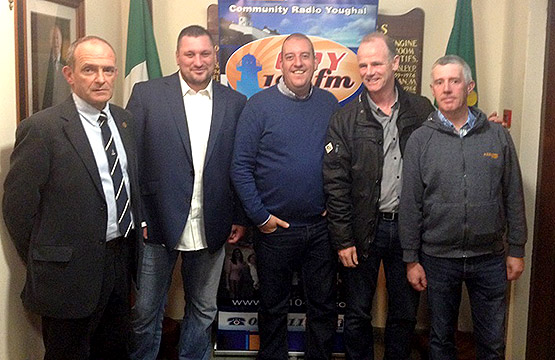
From L-R Commander Cormac Rynne Officer Commanding Shore Operations, Series Producer LS Ron Coveney. LS Alan Cronin, CPO David Hughes, PO James McGrath.
THIS ISLAND NATION broadcasts an extract from the series which begins transmission on CRY 104 FM from Thursday October 22nd at 6.30 p.m., with the second and third parts being broadcast at the same time on October 29 and November 5. The series can also be heard online on www.cry104fm.com produced and presented by Ron Coveney, Leading Seaman in the Naval Service.
The programme also reports the success of Irish lifesavers in winning the top awards in Europe and the huge gift of €8m. which the lifeboat service has received in the form of two historic Ferraris. The reaction of Aran Islanders to winning their battle with the Government over the air service to the islands is also reported.
Bathing Warnings At Youghal Beach For Rest Of Summer Season
#CoastalNotes - 'Poor' water quality off Youghal have seen the Cork town's beach subject to bathing advisories for the remainder of the summer season, as the Irish Examiner reports.
Stricter EU regulations on bathing water quality have prompted Cork County Council to erect notices advising against swimming at the popular Front Strand till at least 15 September.
Regular testing will be carried out in the meantime at the beach, which suffers more than others in the area due to runoff from farms along the River Blackwater which enters the sea nearby.
Youghal has long been identified as a pollution blackspot on the Irish coast, being one of a number of urban areas still discharging untreated wastewater into the sea.
The Irish Examiner has more on the story HERE.
#gp14 – The ideal number of six GP14 dinghies with 12 keen sailors ranging in age from 14 to 20 and from four different clubs participated in Easter Training organised under the burgee of Youghal Sailing Club (formed only 4 months) on Sat, Sun and Mon. Spring had arrived on call only two days before and provided sunshine and light breezes, pretty much ideal for Troy Mc Namara our lead coach to set things up ashore at out temporary campervan club house on Ferry Point, an ideal location in the centre of this beautiful natural harbour.
Saturday's on the water exercises was done inside the wide inner bay where the Blackwater estuary sweeps east after the road bridge and before the gravel/sandy spit which is Ferrypoint, with a break in the middle for hot chocolate and fresh cut sambos provided by Una and Ruth Lee [Greystones and Youghal] and tips and entertainment from Troy. The evening featured Pizza and soft drinks in an activities hall and debrief from Troy armed with lots of film shot during the days action.
Sunday morning's sailing was done in sand ballast bay just to seaward of Ferrypoint and the sunny afternoon was spent tacking in a restricted channel between safety boats and towed buoys and doing starts and triangles out in the main bay off the beach. Evenings debrief once more featured film from the day and pizza that went down very well once more.
Monday dawned very foggy and down at base on Ferrypoint after a few halyards were restrung Troy gave an extended briefing and meteorological explanation while facing a thick fog bank to seaward until eventually he realised the fog had lifted sufficiently in the inner bay behind him to allow launching. Enthusiasm was so high that what was to be just a morning session on the water got extended to coming in for a quick lunch and getting out for another hour of starts and beats. To see everybody cross the line on the gun and get to the weather mark and back in a tight bunch with smiles on their faces and lots of friendly banter so many times, was proof of success and was just what is needed to give the feel good feeling that will keep this gang sailing and hopefully help Youghal focus again on the sea.
Without an existing sailing club or training centre, sailing in this historic sailing ship port is making a comeback spearheaded by schoolboy Adrian Lee who's passion for the sea led him to an old GP14 he kept moored in the harbour Moby Dick was filmed in and from there, to growing a fleet of 12 GPs in 3 years and travelling to GP circuit events as far away as Sligo and Donaghadee to gain experience. GP's have proved ideal for the kind of adventure sailing and racing done by the hardy youngsters of Youghal with their great seafaring tradition and can do attitude.
Youghal Boardwalk Rebuilding Works Under Way
#CoastalNotes - Works have begun on replacing the boardwalk in Youghal on the East Cork coast that was destroyed in last year's winter storms, as the Irish Examiner reports.
The original timber-framed 'eco-boardwalk' at Claycastle beach was open less than two years before it collapsed in the face of brutal storm-force winds in January 2014.
It's now being replaced by a stronger steel frame with hardwood panels imported from Cameroon – at a cost of some €220,000 – and is expected to reopen within six weeks, in plenty of time for the busy summer season.
The Irish Examiner has much more on the story HERE.
Blackwater River Dinghy Cruise Voyages from Youghal to Villierstown
#dinghycruise – As previewed by Afloat.ie, last Saturday four visiting and five local GP14 dinghies crewed by 21 seafarers and two sea dogs set off from Youghal quay in County Cork at low water on the second annual Y2V Blackwater river cruise writes Norman Lee.
Molly the younger sea dog soon got the hang of scrambling to windward on almost every tack but sometimes preferred to stay to leeward to view the wildlife better and she probably set the tone for the many pre teen crews getting a taste for competitive/fun sailing in their respective dads racing machines.
The youngest boat was a beautiful Duffin built this year for Simon Culley and Libby Tierney of Blessington and the oldest, a lovely Bell Woodworking boat nearly 60–years–old and still in perfect fettle, now owned by 16–year–old Jack Nolan of Youghal.
One Mermaid and one Feva came along for the trip which included forming part of the backdrop for a society wedding in Ballintra House a classic yellow mansion, where a band serenaded us as we sailed by on a wide sweep of the river.
Villierstown Boating & Activities Club members at their brand new three week old facility on the riverbank couldn't do enough to make us welcome with hot soup tea and sambos and home cookies when we arrived and a massive fry on Sunday morning and free run of their facilities for the duration.
The value these guys have got from their sports council grant is unbelievable and great credit to all concerned and the welcome the GP visitors get in both Villierstown and Youghal makes it very possible this will be a well attended new addition to the annual GP circuit where the utility design of our boat comes to the fore.
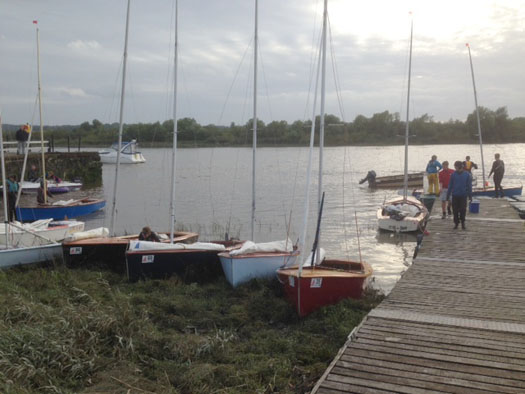
GP14s berth on the river bank
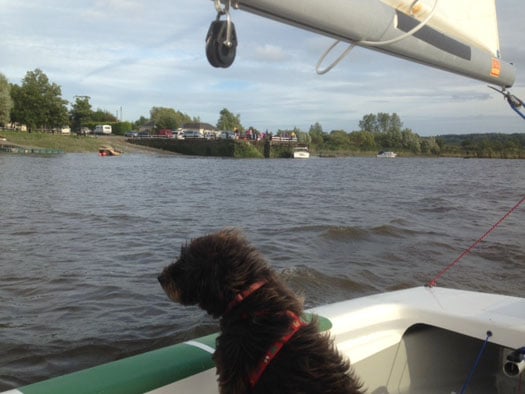
Molly, just one of two seadogs on the cruise keeps a look out
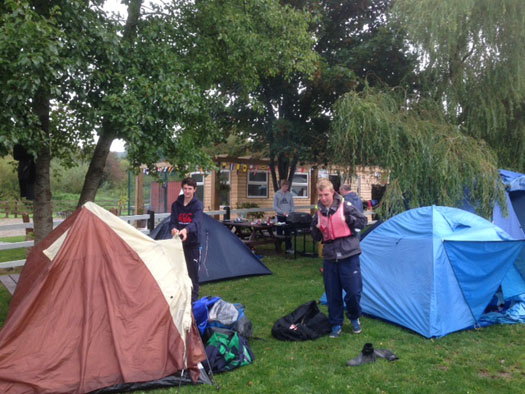
Getting the tents ready at the new Villierstown clubhouse
More on dinghy cruising possibilities here: Is 'Adventure Sailing' a New Tack for Dinghy Sailors?
Sailing in Youghal Boost From Blackwater Voyage to Cappoquin
#youghal – The Munster Blackwater is one of Ireland's mystery rivers writes W M Nixon. Despite comparisons to the Rhine, it keeps much of its long and beautiful length well hidden. And even when it reaches the sea at Youghal, that ancient seaport town manages to be shaped in such a way, with a clutter of waterfront buildings obstructing the view, that it's often impossible to see the water, and whether it's river or sea or both.
As for seeing the boats based there, it's hit or miss. They may be hidden away in muddy little docks, or lying to moorings in the strong tidal stream, or else in the anchorage across the estuary on the east shore at Ferry Point. One way or another, they're well scattered. So anyone voicing the ambition of making Youghal "the Kinsale of East Cork" has a mountain to climb.
But a Youghal schoolboy, Adrian Lee, has come up with a good idea for promoting sailing in Youghal. And while he may not be climbing any mountains, he's planning to take a small fleet of boats – mostly GP 14s - sailing towards the hills and high lands this Saturday, going sixteen miles up the Blackwater, to Cappoquin in West Waterford nestling under the handsome Knockmealdown Mountains.
He knows it can be done, as he has tested the course himself. He bought his first GP 14 four years ago, aged just twelve, with funds he'd saved - "mostly confirmation money". That was an old ex-Naval Service glassfibre boat, which he refitted and learned to sail, mostly self-taught with regular crew Edward Coyne. More recently he up-graded to the creme de la crème, a Duffin boat, and now he's seriously into racing. But he rightly reckons the way to get Youghal interested in sailing the sea is by a cruise-in-company up the incomparable Blackwater to Cappoquin.
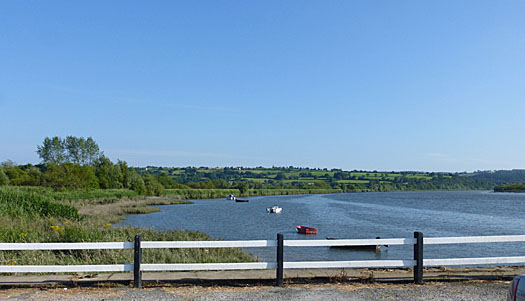
Looking downriver from Villierstown, where the Youghal flotilla plan to overnight on Saturday. Photo: W M Nixon
It has become a two day event this coming weekend, August 30th & 31st, with the enthusiastic support of the Irish GP 14 Association's Norman Lee of Greystones. Norman has already been down to Youghal to sail the course to Cappoquin, and the hope is that maybe ten GP 14s will gather at the waterfront at Youghal at noon on Saturday, and once everyone has got themselves organized, they'll set off together upriver to Cappoquin with a support group including visiting boats from Dungarvan, notably a cruising Mermaid.
They'll take the tide all the way upriver on Saturday afternoon, but as they can get no further with masts stepped than the old railway bridge at Cappoquin, they'll head downriver to pretty Villierstown on the east shore. There, the local sailing and boat club is into its stride with a new clubhouse and a pontoon acquired second-hand when Dungarvan SC were recently up-grading their pontoon facilility in that bustling West Waterford town.
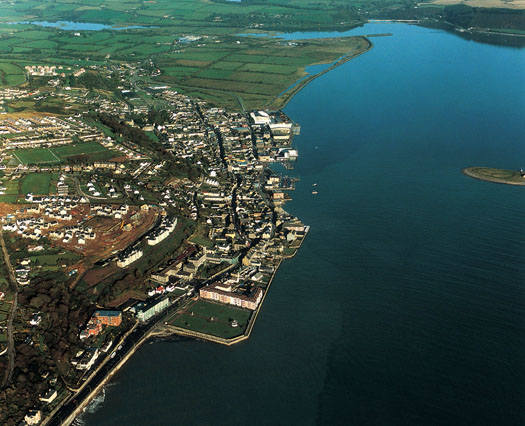
Looking north across Youghal, the aerial view indicates how the crowded waterfront can make it difficult to see the sea. Photo Kevin Dwyer courtesy ICC.
The flotilla will overnight at Villierstown, then they'll take the morning ebb on Sunday to head on downriver, hopefully to reach Youghal at a civilised hour for lunch, while also providing plenty of time for an easy journey home for those who have bought their boats some distance to take part in what could well become a memorable annual event.
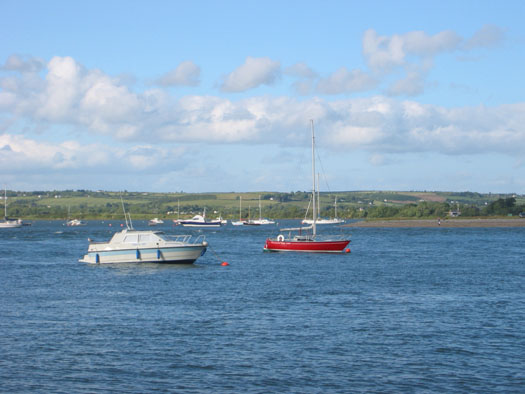
A scattered fleet – boats based in the Blackwater Estuary at Youghal are either on tide-rode moorings off the town (foregound), or in a more sheltered area north of Ferry Point (beyond) on the east side. Photo: W M Nixon
Superyacht Names, Marine Crying & Fog at Sea is Frightening
#islandnation – We were beating on port tack up past Cobh. It was a pleasant night's sailing in Thursday night's cruiser league race out of Monkstown Bay Sailing Club. Then the VHF came alive with the first radio call I have heard from the new Naval vessel, 'SAMUEL BECKETT' which had come up astern, returning from sea. The Naval voice courteously requested if 'ODD JOB,' the yacht on which I was crewing, would alter course, so that the State's ship could make her approach to the Naval Base at Haulbowline, off to our port side.
Our Skipper, John Hegarty, former Class Captain of MBSC Cruiser Fleet, acknowledged with equal courtesy and called a tack so 'ODD JOB' came about to go astern of 'L.E SAMUEL BECKETT' which could then swing across river, gliding into her berth at the Base.
We then brought 'ODD JOB' about again and returned to the racing fray. The alteration cost us first place on handicap by two minutes and forty seconds, but it was the courtesy of good seamanship and it set me to thinking again about the names which are attached to boats, remembering the controversy there had been about the naming of the 'SAMUEL BECKETT.'
I have written about the issue in the current, Summer edition, of Afloat, asking "What's In a Name?" also raising the issue of being called an "islander" and about which it is worth listening to the interview on the July edition of my radio programme, THIS ISLAND NATION on this website (Click HERE to listen), with the last man alive of the islanders who were evacuated from the Blaskets, Gearóid Cheaist Ó Catháin.
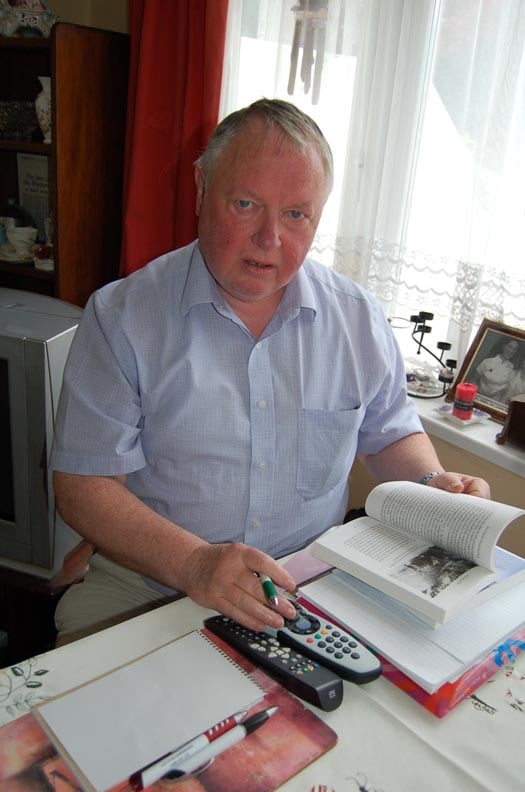
Gearoid Cheaist O Cathain - The Last Blasket Islander
The names attached to boats – and ships – are interesting when you study them.
Ships' names are changed so regularly these days that a vessel can have a string of them and former names can be seen, painted over, on the bow and stern of ships. The old adage that it was unlucky to change the name of vessels no longer seems to apply, though there are quite a few who still believe in this.
I don't, I have changed the name of every boat I owned and still own.
So, how are names chosen and what do they mean?
There is still a fair degree of annoyance in Naval circles about the name Samuel Beckett being applied to their new ship and that the next one is to be called 'L.E JAMES JOYCE.'
The belief, amongst those who have been in regular touch with me about the names, is that it was former Defence Minister, Alan Shatter, T.D., who insisted on these choices, against strong feelings in the Naval Service for continuance of the tradition of mostly naming vessels after figures from Celtic mythology.
In the United States the politically-appointed Secretary of the Navy has the right by law to name its warships. In the late 18th and early 19th centuries, the U.S. Navy had no formal procedure for naming ships. It wasn't until 1819 that Congress passed an act stating that "all of the ships, of the Navy of the United States, now building, or hereafter to be built, shall be named by the Secretary of the Navy." The Secretary has fulfilled this role ever since, even though the passage expressly assigning authority for designating ship names was omitted when the U.S. Code was revised in 1925.
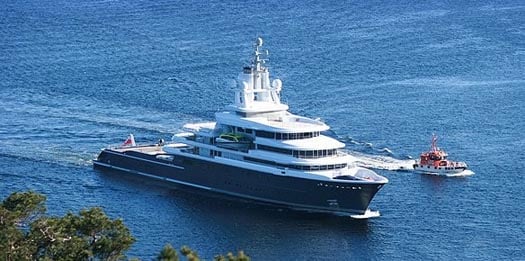
The Luna
The biggest superyacht registered under the British flag is now the 'LUNA,' built originally for the Russian billionaire, Roman Ambramovich, which was switched from Bermuda registration in a process handled by Watkins Superyachts, the London-based agency which is Luna's management and central charter agent. It is the world's largest charter expedition yacht in the world, 115 metres, built in 2010 by the German Lloyd Werft yard, at a cost of $185m.
Abramovich's 'other yacht' is named 'ECLIPSE,' which has its own advanced –missile system. Could that be to deal with Chelsea's misadventures?
The co-founder of Microsoft, Paul Allen, had his super yacht named 'OCTOPUS.' It has hatches at waterline level to form a dock for jet skis.
Amongst Richard Branson's stable was 'NECKER BELLE,' a catamaran for sailing around Necker Island which he owns in the Caribbean.
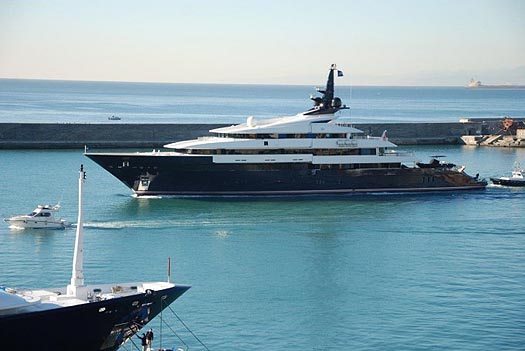
The Seven Seas
Steven Spielberg has 'SEVEN SEAS' which includes an indoor cinema.
Oracle boss Larry Ellison, whose funding of the winning of the Americas Cup dominated the sailing news last year, had 'RISING SUN' built, featuring an extensive wine cellar amongst other luxuries.' It is now owned by film producer, David Geffen.
And of course there were the Irish super yachts of Celtic Tiger times, such as 'THE ULYSSES,' once the subject of discussion in NAMA.
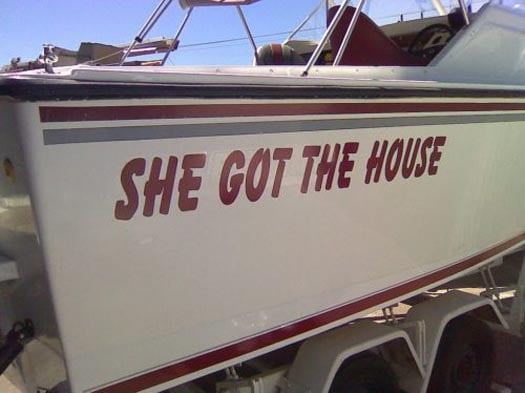
There are some clever names on boats – 'SHE GOT THE HOUSE' – now there must be a story behind that; 'CIRRHOSIS OF THE RIVER' and for those superyachts – 'WHO CARES.
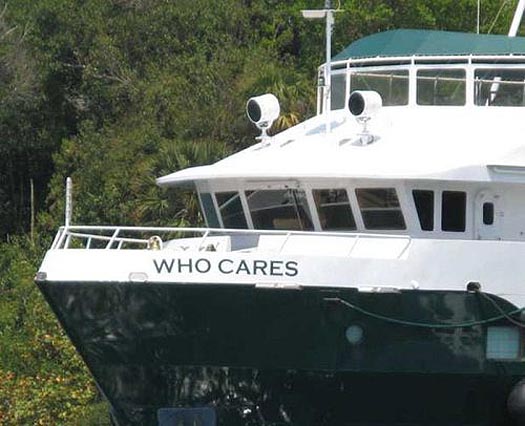
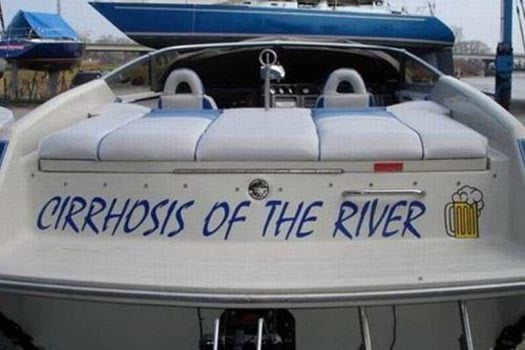
Then there are the regulars to be seen around marinas – 'AQUAHOLIC,' 'CAST AWAY,' 'DUN DREAMIN'; 'HAPPY HOURS'; 'SEA KNIGHT'; ' SEA MIST' 'Y KNOT' 'ALOAN AGAIN'; 'TOYSFORBOYS' 'DARK SECRET' and so on amongst them.....
So, what is in a name?
It should be indicative of confidence, I think, as well as of uniqueness and pride, without arrogance showing of course, unless that is you own a superyacht, when arrogance and naming seem to go together!
Fishing boats are often named by owners after their wives or children, or in a combination of both.
Owners of leisure craft vary widely in their choices, from the predictable to the somewhat bizarre and many shades between.
Commercial reasons can be used to name ships and change them to avoid legal difficulties.
But, does anyone notice what is in a name?
The public was not really energised by the Naval naming controversy.
The first boat I named was a 12 ft. Vagabond dinghy – 'LEGAN SCRIBE.' 'Legan' being traditional in the townland name of Monkstown so the local sailing club took pride in using it. This class of boats, unique at the time in Ireland, insisted that a name must indicate something about the owner. Being a reporter, mine was 'Scribe. The owner of a plumbing business had 'LEGAN LOO' and a butcher's boat was 'LEGAN LAMB'.
When I owned a Ruffian 23 I re-named it 'SCRIBBLER,' ignoring warnings about dangers inherent in changing the names of boats. I did similarly when moving onto a Sadler 25, which I re-named 'SEASCAPES,' as the purchaser of the Ruffian insisted on keeping its name - though a later owner changed it. I was then broadcasting a programme of that name. When I sold the Sadler, its new owner kept the name. So on the Sigma 33 which I now own, I changed its name to 'SEASCAPES II'. The purchaser of the Sadler later changed its name back to an original name it had.
'
While my new radio programme is named 'THIS ISLAND NATION' I won't be re-naming my Sigma. Not for the present anyway. I have thought about it, but the family who sail with me are firmly against it.
THE COAST GUARD CRIER
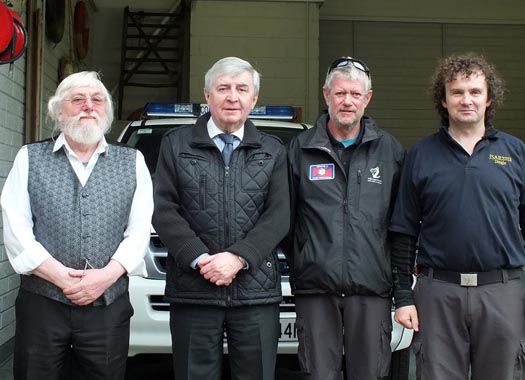
Cliff Winser, Afloat's Tom MacSweeney visiting Youghal Coast Guard station, Mike Lee, officer-in-charge and Tony Lawlor Coast Guard
What's in a name anyway?
For example, the name of Town Crier,' where a maritime man is to represent Ireland at the World Town Crier Tournament in Chester in England next month:
Youghal Coast Guard Station is located on the seafront, overlooking the harbour and Cliff Winser is an ardent believer in the importance of the service:
"There are two things I am particularly proud of in my life, being Receiving Officer for this station when it began operations and being Town Crier. I have been associated with the Coast Guard for a long time and have seen a lot of changes. This station was the first in the country to be completed and handed over to the service which was re-organised in the late 90s. The Coast Guard is not really sufficiently appreciated by the public, but then is any emergency service appreciated by the public until it is needed?" he told me.
"I have been Town Crier in Youghal since the 80s. It was historic and traditional to have a Town Crier and when it was being revived for a festival, I was chosen. Maybe it was my beard that got it for me! Anyway, it has been going since and the townspeople and tourists seem to like it and, with support from the town, I have been nominated for the world competition."
Cliff will be amongst 36 Town Criers from England, Wales, Germany, Holland, Australia, New Zealand, Canada, the Channel Islands and the USA, taking part:
"I'm doing a fair bit of practice at present. It all starts on August 15 and continues until a winner is chosen by the 25th, so it is a long tournament."
TIMELY RADAR WARNING
CHIRP Maritime is the Maritime Confidential Hazardous Incident Reporting Programme operated from the UK. It is a non-profit organisation which issues reports about safety-related issues or 'near misses' in all aspects of the maritime sphere. They published a 'FEEDBACK' newsletter which in its current edition has a detailed account of the close encounter which two yachts, travelling in company, had with a bulk carrier in fog in the English Channel. They were a 30ft. cutter and a 33ft.sloop. Even though they took what they thought to be avoiding action, the ship passed within a hundred yards, without seeing them. All three vessels, watching radar, in altering course to avoid each other, actually altered into the paths of each other at the same time.
The yacht crews were experienced, including an Ocean Yacht Master, an experienced professional Master Mariner and two Day Skippers. All concluded that fog at sea is frightening.




























